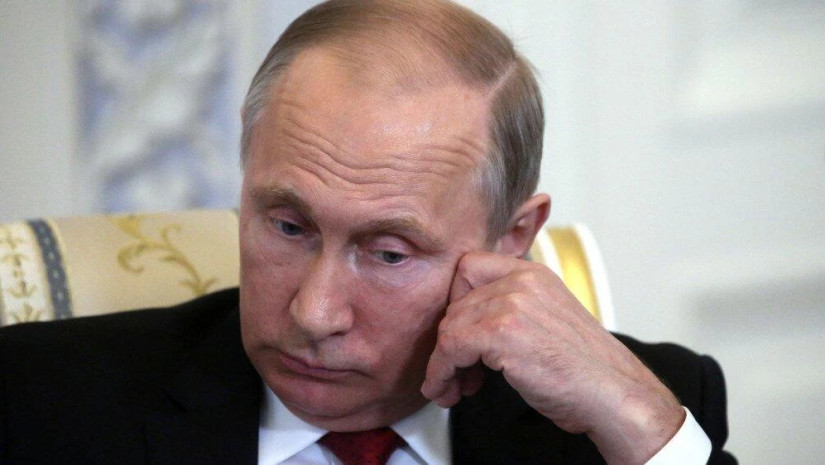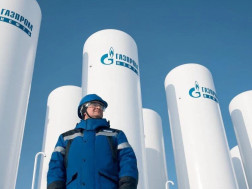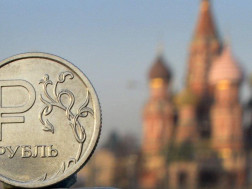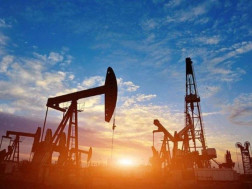Sanctions, falling prices for oil and natural gas and sinking demand for Russian hydrocarbons — tainted by Moscow’s invasion of Ukraine — will hammer the Kremlin’s coffers this year and could see the country's massive sovereign wealth fund take a major hit.
Oil and gas export revenues accounted for 45 percent of Russia’s government budget last year. Despite sanctions and efforts to ditch Russian energy, it raked in €155 billion from oil and gas exports in 2022 — 30 percent higher than the previous year — preliminary data shows.
But Russia's windfall profit honeymoon is over, experts say.
On Tuesday, Finance Minister Anton Siluanov said the budget deficit last year was 2.3 percent of GDP — before the full-scale invasion of Ukraine Russia was running a surplus.
In its government budget, set out in December, the Kremlin predicted that its oil and gas revenues will fall by 23 percent this year. But Alexandra Prokopenko, an independent analyst and former Moscow central bank official, called that figure “very optimistic.” Her own estimate is that those revenues will fall by about a third.
Slowing oil and gas revenues come as Russia is ramping up its defense budget to finance its war in Ukraine and mobilization plans to send hundreds of thousands of ill-trained troops to the front lines threaten to undermine the country's economy in the long run.
“It’s pretty clear that this year will be quite tough for the Russian budget,” said Prokopenko. “Russia lost its premium [EU] market both for oil and mostly for gas.”
Natural gas exports made up between 10 percent and 15 percent of government revenues last year, but they have fallen sharply as the EU scrambled to diversify its supplies while the Kremlin cut flows to Europe through routes including the now-destroyed Nord Stream undersea pipeline
As a result, Gazprom announced last week that natural gas exports had plummeted by 46 percent last year.
“I would expect now that it's really starting to hurt,” said Georg Zachmann, senior fellow at the Bruegel think tank.
There are signs that Moscow is trying to backtrack.
Russian President Vladimir Putin signed a decree in late December easing a requirement for ruble-only payments for gas for “unfriendly” — mostly EU — nations. Several countries had refused to comply with the previous requirement, leading to their deliveries being cut off.
Black gold
Russia’s more lucrative oil exports are in doubt too.
The EU's near-total ban on imports of seaborne Russian crude starting December 5 is “is the most significant measure implemented so far … on the Russian budget,” said Janis Kluge, senior associate at the German Institute for International and Security Affairs. An EU ban on Russian oil products that starts on February 5 will magnify this, he added.
The impact of a G7 scheme to cap the price of Russian oil at $60 per barrel is still unclear, but there are initial signs that traders in nonparticipating nations like China are using the measure to barter for greater discounts. Russia's Urals grade crude is trading at $37.90 a barrel, according to price reporting agency Argus, while benchmark Brent crude price is just over $80 a barrel.
The Kremlin has responded by saying it will ban all crude exports to countries participating in the G7 price cap from February 1 and curb production by up to 700,000 barrels per day — or 7 percent of its daily output.
But Russia only has a limited shipping fleet and has relied on Western tankers to deliver its oil, Prokopenko said. She called Putin's effort to punish countries that obey the G7 scheme “quite toothless” as many details haven't been fleshed out yet.
Moscow “hasn't [got] enough tools to answer properly,” she said.
The picture is made even worse because central banks are raising interest rates to bring inflation under control — and slowing economies use less energy, Kluge said.
Russia's economy is expected to contract by 2.7 percent in 2022, said Siluanov. The government estimates it will run a budget deficit of 2 percent of GDP for 2023. But 3 percent is more realistic, according to Kluge.
These costs won't affect Putin's war strategy, he said, pointing the fact the Kremlin is increasing its military and domestic security spending by 50 percent in this year's budget.
But it does mean “strong tradeoffs” in the budget, seen in real-term cuts to areas like health care and education, while public and infrastructure spending alone are being cut by one-fifth.
For now Russia is sucking money from its €149 billion sovereign wealth fund, with Siluanov saying he expects a $29 billion withdrawal. Kluge predicted that the fund could run dry “by 2025.”
The Kremlin “is basically selling out the future to finance the war right now,” he said, Politico reports.
















